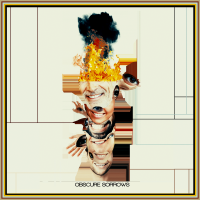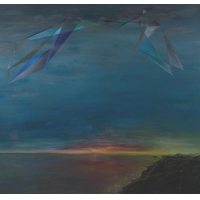Home » Jazz Articles » Album Review » Ryan Carraher: Obscure Sorrows
Ryan Carraher: Obscure Sorrows
Carraher's quintet is almost repeated from his previous group album Vocturnal (Self Produced, 2016): drummer Steve Wilkinson (also credited with arrangements on two tracks), bassist Greg Toro, pianist/keyboardist Evan Waaraama, and new saxophonist Colin Edgar. The program begins with "Pâro," which means "the feeling that no matter what you do is always somehow wrong—as if there's some obvious way forward that everybody else can see but you." Even without knowing the meaning of the title, there is a vexed feeling in the nagging circular pattern that repeats through most of the piece, which is especially at cross-purposes with the solos. It finally drops away during Waaraama's piano solo, giving him space to play more freely and lyrically. Carraher continues in the same vein for his guitar solo (without piano), and ends the tune unaccompanied.
"Daguerreologue" brings in the full quintet for "an imaginary interview with an old photo of yourself, an enigmatic figure who still lives in the grainy and color-warped house you grew up in." After a drum roll, a cacophony of guitar and saxophone lines breaks out—a twisting, chromatic conversation that plays out at greater length as the tune progresses. Edgar gets his own unaccompanied saxophone spotlight, worrying at repeated licks before being rejoined by Wilkinson's drums. The track ends with a contemplative rubato centering around electric piano.
"Kuebiko" ("a state of exhaustion inspired by an act of senseless violence, which forces you to revise your image of what can happen in this world") is well illustrated in a dramatic series of gestures that makes its point in two and a half minutes, by far the shortest tune here. Most of the album continues in the same vein. Carraher's expansive compositions each have a distinct, often unsettled emotional tone. They utilize sectional forms that go beyond head and solos, and give the entire band space to interact freely as well as express themselves individually.
"Klexos I" and "Klexos II" ("The Art of Dwelling on the Past") end the album with a dramatically different sound, one much closer to contemporary chamber music than to jazz. Featuring soprano Anna Ward's vocalise and Edgar's flute, they also find Toro playing arco bass and Wilkinson on vibraphone and percussion. In addition to forming a haunting final impression, they demonstrate the range of Carraher's compositions, as well as the capabilities of his band mates.
Track Listing
Pâro; Daguerreologue; Lachesism; Olēka; Kuebiko; Vemödalen; Altschmerz; Klexos I; Klexos II.
Personnel
Ryan Carraher
guitar, electricRyan Carraher: compositions, arranging, guitar; Steve Wilkinson: drums; Greg Toro: bass; Colin Edgar: saxophone; Evan Waaraama: keyboard, piano; Anna Ward, soprano (8, 9).
Album information
Title: Obscure Sorrows | Year Released: 2018 | Record Label: Self Produced
Tags
PREVIOUS / NEXT
Support All About Jazz
 All About Jazz has been a pillar of jazz since 1995, championing it as an art form and, more importantly, supporting the musicians who make it. Our enduring commitment has made "AAJ" one of the most culturally important websites of its kind, read by hundreds of thousands of fans, musicians and industry figures every month.
All About Jazz has been a pillar of jazz since 1995, championing it as an art form and, more importantly, supporting the musicians who make it. Our enduring commitment has made "AAJ" one of the most culturally important websites of its kind, read by hundreds of thousands of fans, musicians and industry figures every month.






















